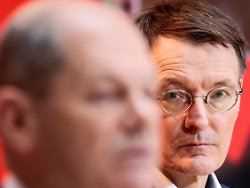On the one hand, it was to be expected that Karl Lauterbach will become Minister of Health: “Who else?”, One might ask. Still, the personnel is a big surprise. However, one that makes sense.
On Sunday evening at Anne Will’s, Karl Lauterbach was still completely Karl Lauterbach as we know him. He talked about Omikron, about incidences and about new studies that he read “every hour”. Until the moderator asked him whether Olaf Scholz had called now. To let him know that he will be the next Minister of Health. But instead of confirming the possible cheer, Lauterbach responded like a party soldier who assumes that he will not.
The SPD had a lot of people who could, he said, and that the decision had not yet been made. Whereupon the Duisburg intensive care doctor Carola Holzner beamed at him and said that she and her colleagues would be very happy if he became Minister of Health. “I appeal again, there is no one who does it like you”. And even then Lauterbach kept his poker face. “Maybe Olaf Scholz is watching,” was all he said.
Twelve hours later Scholz is standing in the Willy Brandt House, the SPD party headquarters, and says: “It will be!” You’d think he’d listened to Lauterbach’s advocate on the show – but it wasn’t. According to reports, Lauterbach already knew that he was going to be a minister while he was sitting in the studio and still pretending that nothing had been decided. You don’t have to blame him for that. In politics you have to be able to remain silent from time to time. Which Lauterbach might have reassured some critics by the way, but more on that later.
“He will”
In the morning in the Willy Brandt House, Scholz said after a few introductory words: “And that’s why, there is no other way of saying it, most citizens certainly wanted the next Minister of Health to be a specialist and do it really well that his name is Karl Lauterbach. ” He put on his slightly pinched Scholz smile and Lauterbach almost stormed onto the stage, after all, he must have waited many years for this moment. First he thanked his party for their trust and then “the population”. His first message: “We will master the pandemic.”
There was a good reason why he was the first to thank the party. Because although Lauterbach was likely to have been the obvious choice as health minister for most people in the country, his nomination was by no means finalized. From the parliamentary group it was heard that not all hearts flowed to him there. Rather, some are said to have been annoyed by his professorial nature. “Karl has read a study again,” they said. Seen in this way, his quick thanks to the party was also a hint to the party that he should hardly care and that he does not see himself as a pandemic one-man show.
An alternative candidate was Sabine Dittmar, the health policy spokeswoman for the SPD and thus formally the specialist of her party. By the way, she is also a doctor. So there was an expert who hardly anyone knew, but who was held in high regard internally. If someone like Lauterbach is on TV all the time, that can also cause displeasure. According to the motto: Ms. Dittmar works here in the Bundestag while someone else gets all the attention. Her womanhood could also have spoken for her, since Scholz wanted at least as many women as men in the cabinet.
“Nicholas is when wishes are fulfilled”
It would be unfair to assume that this presumably existent urge to be recognized as the only motivation. He is a doctor and epidemiologist, so it makes sense that he should speak out in public often and in detail. No wonder that a lot of the media are raging around him. This communicative aspect should not be underestimated: Millions of people already know Lauterbach and trust him. If such an expert also becomes a minister, it could help fight the pandemic, simply because he is one of those who are listened to. In any case, his professional qualification as a minister is beyond question.
Nevertheless, one can also have doubts about Lauterbach. For example, he has yet to prove that he is capable of running a large ministry and actually making politics. However well-versed he may be in the matter, whether he as a professor can reform the health system, and maybe even improve it, remains to be seen. But all others who would have come into question for the office would have stood in this obligation.
But the choice also makes perfect sense from Scholz’s point of view – because Lauterbach would probably have remained what he already was: a shadow health minister. Now, in a certain way, he puts Lauterbach on the chain. Now he is responsible and can no longer comment on government policy from the sidelines. This makes life a little easier for the future Chancellor. He also saves the displeasure of the numerous Lauterbach fans, including among journalists.
And who knows, maybe there was simply no one else who wanted to take over the office and then become Minister of Health “under Karl Lauterbach”, as some think. Its fans will stick with Kevin Kühnert. The vice-chairman of the SPD tweeted: “Nikolaus is when wishes are fulfilled. You wanted him – you get him. Health Minister Karl Lauterbach!”
